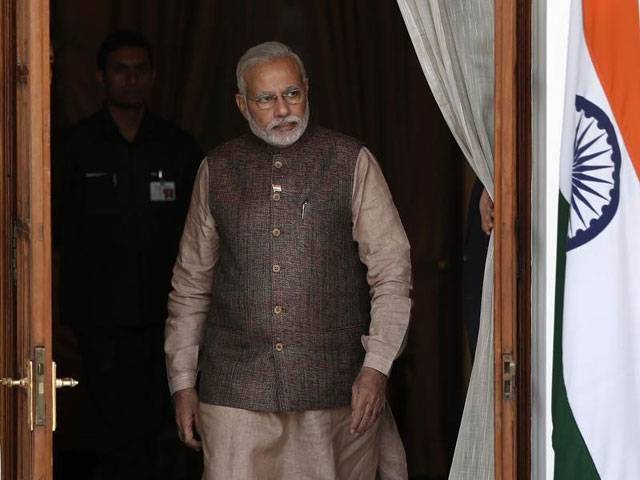SRINAGAR - 3Indian Prime Minister Narendra Modi pledged on Friday to “win the hearts” of the Kashmiri people as he faced a hostile reception during his first visit as prime minister to the tense Himalayan region.
Narendra Modi was greeted by near-empty streets lined by security personnel on his first official visit to Occupied Kashmir, as Kashmiri leaders enforced a strike to demand political dialogue about the future of the divided region.
Demonstrators in Azad Kashmir burnt an effigy of Modi and India’s tricolour flag on Friday to protest the prime minister’s visit.
Schools and shops were shuttered and normally busy roads were free of traffic in Srinagar, when Modi arrived to meet army commanders in one of the world’s most militarised regions.
“It is our earnest wish that Mr Modi and the newly elected NDA government understand the ardent political message we seek to convey through this act,” said APHC leader Mirwaiz Omar Farooq.
Indian police erected barricades to stop and search vehicles entering Srinagar ahead of Modi’s arrival, and soldiers flanked main roads throughout the Himalayan region that has been racked by insurgency for decades.
Modi has long been associated with a Hindu nationalist organisation that wants to end the semi-autonomous status that Muslim-majority Kashmir nominally enjoys. His government has promised to renew the debate on the sensitive issue.
On Friday, Modi inaugurated a railway line in Katra town, 270 kilometres from Srinagar, that links a popular Hindu shrine in the disputed region with India’s vast and neglected railway network.
“Our railway stations can be better than airports. This is possible,” Modi said after flagging off the first train on the Udhampur-Katra line. “Private parties can also participate, they will also benefit,” he added.
“It is every Indian’s dream to see happiness and prosperity in Jammu and Kashmir,” he said.
“My aim is to win the hearts of the people of the state.”
The line is part of an ambitious project to connect the Kashmir Valley with the network sometime in 2017.
The trip by Modi, whose party secured a landslide win in polls in May on a pledge to revive the economy, has provoked a sharp reaction from influential Kashmiri groups which called a general strike.
Businesses were mostly closed in Srinagar as a result and the city’s streets were largely deserted, while top Kashmiri leaders were put under house arrest in a security crackdown ahead of Modi’s arrival. Kashmiri leaders rejected Modi’s comments on Friday, reiterating demands for a political process to resolve the dispute over Kashmir.
“Development is fine but our primary aspiration is security, right to life and fundamental political rights which will come when the Kashmir dispute is resolved,” Mirwaiz Umar Farooq, told AFP from his house where he is confined in Srinagar.
He criticised Modi’s decision to visit Kashmir on the first Friday of Ramazan which meant he was barred from leading prayers in the city’s main mosque as part of the crackdown.
Another Kashmiri leader Yasin Malik also rejected Modi’s comments on development, saying it would never take priority “over our demand for freedom and self government”.
Ahead of the visit, Modi sparked anger in the region over his apparent plans to curb the region’s autonomy.
During election campaigning, Modi had argued for “a discussion” about Article 370 of the Indian constitution, which specifies that laws passed by the national parliament are not applied to Kashmir unless approved by the local legislature.
In May, soon after Modi took office, junior minister Jitendra Singh said that the federal government had “begun the process” of abrogating the constitutional provision that gives India’s only Muslim-majority state its special status.
On Friday, Modi also met troops and held a security meeting at army headquarters in Srinagar where hundreds of police and paramilitary were seen patrolling the streets.
Restrictions for the visit were also imposed on civilians’ movements in parts of the city’s volatile old town, a top police officer told AFP on condition of anonymity.
Modi was expected to travel to the town of Uri close to the disputed border with Pakistan to inaugurate a hydro-power project.
The day before Modi’s visit, Kashmir’s top cleric Mufti Bashir-un-Din Ahmad, said the Pandits would be welcome to return, but warned against a proposal to create separate settlements for them.
Others weren’t as diplomatic. Hardline, pro-Pakistan separatist leader Syed Ali Shah Geelani claimed Modi’s government was planning to water down Kashmir’s ethnic and religious demographics by settling “Hindu fundamentalists” along with the Pandits. “The aim is to change the demography of the state and create a permanent social division in Kashmir,” said Geelani, who commands a large following among Kashmiri youth.
Friday, April 19, 2024
Shutdown in IHK greets Modi on first visit

Caption: Shutdown in IHK greets Modi on first visit
US, UK unveil sweeping sanctions on Iran’s drone program
April 19, 2024
CNG prices to go up once again
April 19, 2024
Govt encouraging investments in ICT: Shaza
April 19, 2024
Appointed
April 19, 2024
Hepatitis Challenge
April 18, 2024
IMF Predictions
April 18, 2024
Wheat War
April 18, 2024
Rail Revival
April 17, 2024
Addressing Climate Change
April 17, 2024
Justice denied
April 18, 2024
AI dilemmas unveiled
April 18, 2024
Tax tangle
April 18, 2024
Workforce inequality
April 17, 2024
New partnerships
April 17, 2024
ePaper - Nawaiwaqt
Advertisement
Nawaiwaqt Group | Copyright © 2024





